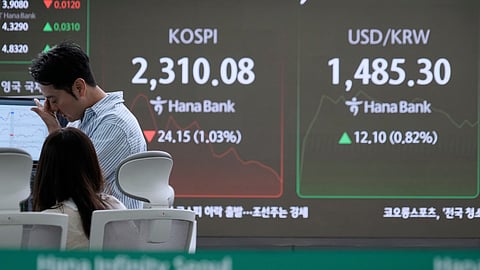

NEW YORK: Asian shares slipped on Wednesday as the latest set of US tariffs, including a massive 104% levy on Chinese imports, went into effect.
Japan's Nikkei 225 index initially lost nearly 4% and other markets in the region also declined.
The sharply higher tariffs kicked in after midnight Eastern time in the US, even as investors have no idea what to make of President Donald Trump's trade war.
On Tuesday, the S&P 500 dropped 1.6% after wiping out an early gain of 4.1%. That took it nearly 19% below its record set in February.
The Dow Jones Industrial Average dropped 0.8%, while the Nasdaq composite lost 2.1%.
Uncertainty is still high about what President Donald Trump will do with his trade war.
More swings up and down for financial markets are excepted given the uncertainty over how long Trump will keep the stiff tariffs on imports, which will raise prices for U.S.shoppers and slow the economy.
If they last a long time, economists and investors expect them to cause a recession. If Trump lowers them through negotiations relatively quickly, the worst-case scenario might be avoided.
Bangladesh manufacturers worried about losing market share in US Garment manufacturers and exporters in Bangladesh, the world's second largest after China, are worried about losing its share in the apparel market of the United States, which is imposing new tariffs of 37%.
The US is Bangladesh's largest market as a single destination where the country's nearly $39 billion industry exported apparel goods worth $7.34 billion in 2024.
Now, Bangladesh's manufacturers say their US buyers are halting orders, which could help competitors like India and Pakistan overtake Bangladesh in the U.S.market.
Bangladesh has already sought postponement of the application of the new tariff for three months to help the country assess the situation and smoothly implement its initiatives.
Asif Ashraf, managing director of Urmi Group, says they are worried about the U.S.market 'because it will change the global equilibrium.'
The sector employed about 4 million workers, mostly women from rural areas, and the industry accounts for about 80% of the country's total annual export.
South Korea launches emergency funding programme for automobile industry South Korea has launched an emergency funding programme worth 3 trillion won (USD 2 billion) to help its automobile industry cope with the impact of increased tariffs imposed by the Trump administration.
The government package announced on Wednesday includes expanded low-cost financing from state-run lenders, as well as a new financing program backed by auto giants Hyundai and Kia, along with financial institutions, aimed at supporting struggling carmakers and auto parts manufacturers.
The government will also expand subsidies for electric vehicle purchases.
Cars and auto parts stand as South Korea's top export items to the United States, according to the Ministry of Trade, Industry and Energy, which raised concerns that the Trump administration's imposition of a 25% tariff on these products will have a 'significant shock' on the industry.
The ministry says South Korea's exports of automobiles to the United States totaled $34.7 billion last year, while exports of auto parts amounted to $8.2 billion.
Canada retaliates with 25% auto tariffs in response to Trump's import taxes In response to President Donald Trump's tariffs, Canada says it's implementing retaliatory tariffs of its own just after midnight on Wednesday.
Canada will put a 25% tariff on auto imports from the United States that do not comply with the USMCA, the 2019 North American trade pact put into place during Trump's first term.
The Canadian government is also putting in a framework to bolster auto production and investment in its country as well as providing a special exception on tariff countermeasures for residents of Campobello Island, New Brunswick.